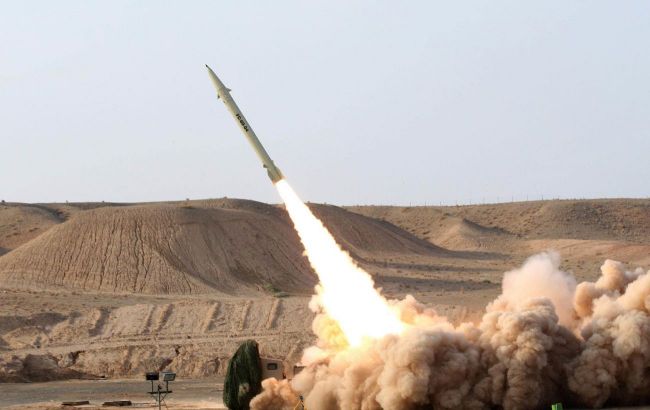Why Iran decided to supply ballistic missiles to Russia and what it means
 Iran's Fath-360 complex in action (photo: Getty Images)
Iran's Fath-360 complex in action (photo: Getty Images)
Iran has handed over ballistic missiles to Russia that could be used against Ukraine.
RBC-Ukraine explains the consequences of this step and what Ukraine should expect next.
Contents
- What's behind ballistic missile transfer: Ukraine and Middle East
- Sanctions against Iran in response
- Prospects for lifting ban on long-range strikes against Russia
US Secretary of State Antony Blinken says that Russia has received ballistic missiles from Iran and may use them against Ukraine in the next few weeks. The Iranian mission to the UN officially denies that Tehran is supplying its ballistic missiles to Russia.
However, Ahmad Bakhshayesh Ardestani, a member of the National Security and Foreign Policy commission of the Iranian parliament, said that the supply of missiles and drones was “part of a barter” with Russia. The specifics of the delivered items are still unknown. But earlier, Russia requested Fath-360 missiles, which can hit targets within a radius of 120 kilometers.
What's behind ballistic missile transfer: Ukraine and Middle East
Iran's decision to provide Russia with ballistic missiles was not spontaneous. European and American media have been reporting on such a possibility since early 2024. On the one hand, deliveries were postponed due to the need to train personnel.
On the other hand, Iran has long been reluctant to raise the stakes in its relations with the United States. Unlike Shahed drones, ballistic missiles fired into Ukraine can cause serious damage, thus changing the situation on the battlefield. This automatically creates even more tension with the United States.
Washington's position is important to Iran, considering events in the Middle East. The situation there has long been teetering on the brink of a major regional war.
The tension has been ongoing since October 7 last year, when Hamas carried out a terrorist attack on Israel, and the latter responded by launching a military operation against terrorists in the Gaza Strip. Iran and its allied groups sided with Hamas. The situation became especially dramatic in August of this year, when the head of the Hamas political bureau, Ismail Haniyeh, was assassinated in Tehran. In response to his elimination, Iran threatened to retaliate but tied the possibility of revenge to Israel's negotiations with Hamas under US mediation.
While the talks are stalled, Iran seems to have finally lost hope of reaching an understanding with the West. So the provision of ballistic missiles is, among other things, a signal to the United States. Importantly, the exchange of military equipment between Iran and Russia adds to the problems on both fronts: Ukraine and the Middle East.
“In exchange for missiles, Iran has long asked for technology. Iran's weaknesses are aviation, missile defense, and air defense. Iran is interested in these things,” Ivan Us, chief consultant at the Center for Foreign Policy Studies of the National Institute for Strategic Studies, told RBC-Ukraine.
It is about Su-35 fighters and S-400 air defense systems at least. Both countries agreed to supply them last year. There were reports in the American press about the first deliveries of the aircraft in April of this year, but Iran officially denies the fact of deliveries, as well as other similar cases.
The ballistic missiles give Russia additional capabilities to shell Ukraine, while Russian aircraft and air defense systems strengthen Iran's ability to counter Israel in a potential war.
Sanctions against Iran in response
In response to the provision of ballistic missiles to Russia, the United States and the United Kingdom announced new sanctions against Iran. The US sanctions list includes 10 individuals, 6 legal entities, and 4 vessels that Iran used to supply Russia with weapons. The United States also imposed additional restrictions on Iran Air.
The UK, France, and Germany, in turn, announced new sanctions against Iran's air transport, including the cancellation of bilateral agreements with the Islamic Republic. However, the effectiveness of the restrictions remains a separate issue, as in the case of Russia.
“Iran's experience is the experience of how sanctions do not work. And Russia, after a full-scale war broke out, is primarily interested in Iran's experience of how to circumvent sanctions,” says Ivan Us.
“From what is promised, I think, most crucial is tighter control over the sanctions that are in place, and most importantly, secondary sanctions. Experience shows that such restrictions can be most effective against both Russia and Iran, i.e. sanctions against countries that will supply something to Russia or Iran,” the expert added.
Just like Russia, Iran widely uses a shadowy fleet of tankers to illegally export its energy resources to world markets. According to TankerTrackers, Iran exported an average of more than 1.7 million barrels of oil and oil products via shadow tankers in 2023.
Prospects for lifting ban on long-range strikes against Russia
The supply of Iranian ballistic missiles raises the question to Ukraine and its allies of how to neutralize this factor and minimize the damage it can cause. One way is to provide Ukraine with additional air defense systems capable of shooting down ballistic missiles. However, the allies' existing systems, primarily Patriot, are not sufficient. Not to mention that their deployment takes time.
Another option is to allow Ukraine to hit the platforms in Russia from which Iranian missiles are launched. At the end of June, The Washington Post quoted Ukrainian officials as saying that the United States had authorized Ukraine to use American weapons to strike Russia up to 100 kilometers from the border. The authorization does not apply to key air bases in Russia. There is also a ban on longer-range strikes. The United States also has banned using British Storm Shadow missiles in Russia because they have American-made parts.
Amid supplies from Iran, discussions in Washington about lifting the ban have gained new momentum. On September 10, US President Joe Biden said that his administration was "working that out right now”. On Friday, September 13, Biden is expected to speak with British Prime Minister Keir Starmer on this matter. Trilateral consultations between Washington, London, and Kyiv are also expected during a joint visit of the top US and UK diplomats to Ukraine.
According to the Times, the issue is likely to be resolved before the meeting of world leaders at the UN General Assembly in New York, scheduled for September 22-23.
Ukraine is considering various options for responding to the supply of Iranian missiles to Russia, including cutting diplomatic ties with Iran.
Sources: Washington Post, CNN, Reuters, TankerTrackers and comments of Ivan Us, chief consultant of the Center for Foreign Policy Studies at the National Institute for Strategic Studies.

